Google’s AI chatbot, Gemini, which we once knew as Bard, has exploded in popularity. From its launch, it has quickly captured the attention of millions worldwide.
As we look towards 2025, the numbers tell a clear story of an AI platform deeply integrated into our daily lives.
Gemini’s Impressive Reach: Millions of Users and Growing
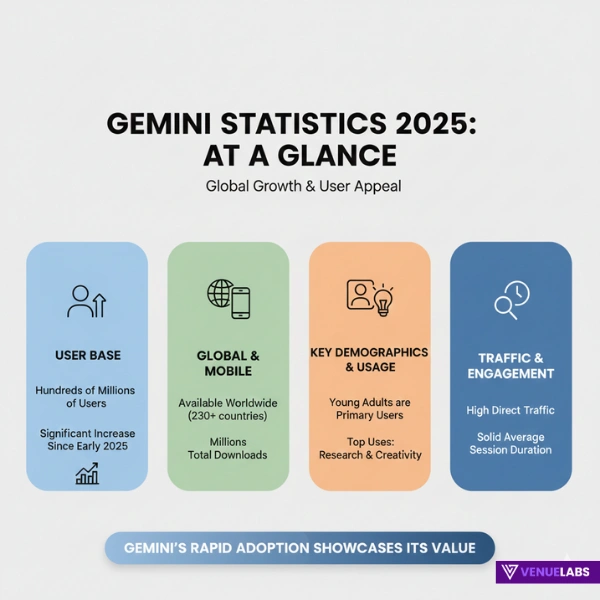
Gemini has achieved remarkable growth, solidifying its position as a leading AI tool. Currently, the platform boasts nearly 400 million monthly visits.
This huge number shows that people around the globe are consistently engaging with Gemini for a variety of tasks.
The average visit duration on Gemini is around 4 minutes and 40 seconds. This isn’t just a quick glance; users are spending significant time interacting with the AI, asking questions, refining prompts, and exploring its capabilities.
This strong engagement signals that Gemini is becoming an essential tool for many.
Gemini’s Ascent: Monthly Visitor Trends
Let’s look at the consistent upward trend in Gemini’s monthly visitor numbers, showcasing its steady growth and increasing reliance by users.
| Month (2024) | Number of Monthly Visits | What This Shows |
| July | 271.4 million | Strong, steady usage heading into the second half of the year. |
| August | 267.9 million | A slight dip, which is normal for online platforms, but still a massive user base. |
| October | 291.6 million | Growth picks back up, showing increasing reliance on the tool. |
| November | 275 million | Consistent high traffic, solidifying its place as a go-to AI assistant for millions. |
| March (2025) | 350 million | Significant jump, indicating rapid adoption and increasing awareness. |
| May (2025) | 400 million+ | Reaching a new milestone, positioning Gemini as a dominant force in the AI chatbot market. |
Source: Statista
Google aims to reach 500 million users by the end of 2025. This ambitious target reflects Gemini’s clear upward trajectory and its strategic importance to Google’s future.
Also read about: Generative AI Statistics
Who Uses Gemini? Unpacking User Demographics
Understanding who uses Gemini helps us see its impact. The data reveals a user base that is often young, comfortable with technology, and slightly more male.
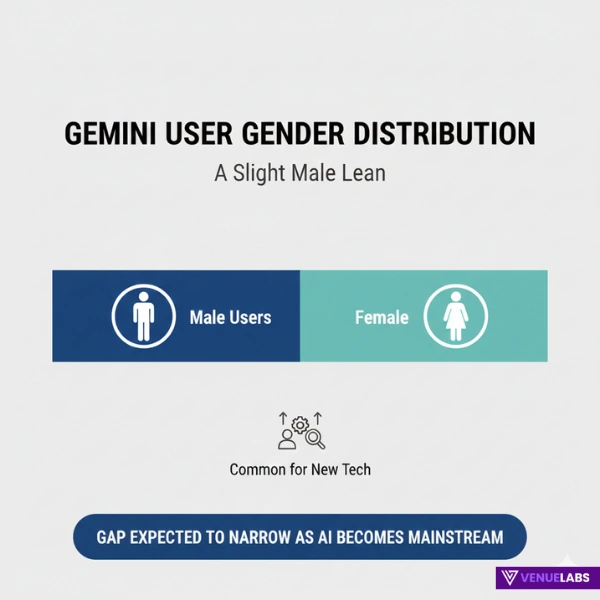
Gender Distribution: A Slight Male Lean
When we examine the gender split, we see a notable, but not extreme, difference.
- Male Users: 58.52%
- Female Users: 41.48%
This suggests that Gemini currently has a higher usage rate among males. This pattern is common for new technology platforms, especially in the AI space, which often attracts early adopters from tech and development fields. As AI becomes more integrated into everyday applications, this gap will likely narrow.
Also read about: ChatGPT Statistics
The Age of Gemini: A Millennial and Gen Z Power Tool
Gemini truly resonates with younger generations who are digitally native and eager to leverage AI for productivity and creativity.
The largest group of users consists of millennials aged 25 to 34, making up a significant 31.10% of the entire audience. Following closely are Gen Z users aged 18 to 24, representing 23.27%.
This data clearly shows that Gemini is not just a passing trend. It serves as a powerful utility for the generations actively shaping the modern workforce and digital landscape.
Here is a detailed breakdown of Gemini users by age group:
| Age Group | Share Of Visitors | Typical Use Cases |
| 18 to 24 years | 23.27% | Students and young adults use Gemini for homework, essay writing, coding projects, and creative inspiration. |
| 25 to 34 years | 31.10% | Young professionals leverage Gemini for work-related tasks like drafting emails, summarizing reports, brainstorming ideas, and conducting research. |
| 35 to 44 years | 19.07% | Established professionals integrate Gemini into their workflow to boost productivity, analyze information, and solve complex problems. |
| 45 to 54 years | 13.15% | Individuals in this age range use Gemini for a combination of professional tasks, personal projects, exploring new technologies, and learning. |
| 55 to 64 years | 8.24% | Users in this age group explore Gemini for hobbies, travel planning, learning new skills, and general information retrieval. |
| Over 65 years | 5.18% | Though the smallest group, this shows AI is becoming increasingly accessible across all demographics, used for personal assistance, research, and staying informed. |
Source: mylearning.org
Gemini’s Global Footprint: Where Users Live
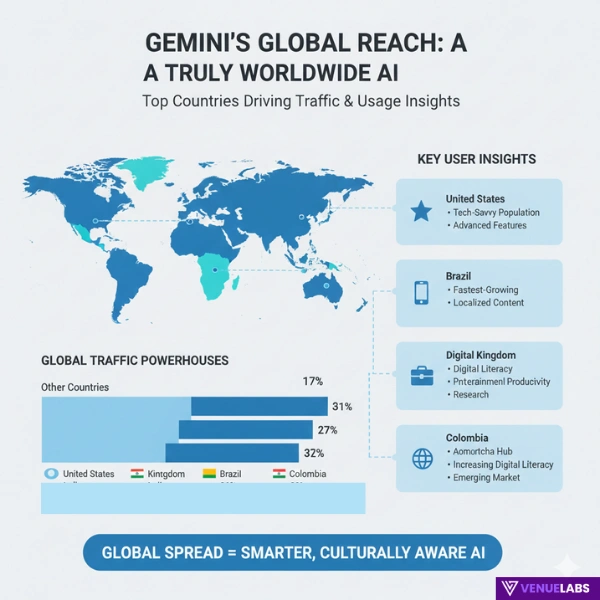
Gemini is a truly global product, available in over 230 countries and territories and supporting 46 languages. However, certain countries contribute the most significant traffic.
| Country | Percentage of Traffic | Insights into Usage |
| United States | 14.6% | As Google’s home country, the U.S. received early access to Gemini and boasts a large, tech-savvy population that quickly adopted the platform. It remains a primary market for advanced AI features. |
| India | 9.18% | India’s massive, mobile-first population and strong interest in technology make it one of Gemini’s fastest-growing and most crucial markets, especially for mobile app usage and localized content generation. |
| Brazil | 4.38% | Brazil shows strong adoption in South America, where users are highly engaged with social media and digital technologies. Gemini sees significant use for entertainment and creative content here. |
| United Kingdom | 3.36% | The UK is a key European market with high levels of digital literacy and a thriving tech sector. Gemini is utilized for professional productivity and research by a substantial portion of its users. |
| Colombia | 3.32% | Colombia’s presence in the top 5 highlights the growing importance of South America for AI platforms like Gemini, reflecting increasing digital literacy and demand for advanced tools in emerging markets. |
| Other Countries | 65.16% | This large “Other” category emphasizes Gemini’s truly global reach, with significant user bases spread across numerous countries, each contributing to the AI’s diverse usage patterns and feedback. |
This global spread is a huge advantage for Google. By learning from users all over the world, Gemini can become better, smarter, and more culturally aware, adapting to diverse linguistic and cultural nuances.
Also read about: Perplexity AI Statistics
How People Use Gemini: Everyday Applications
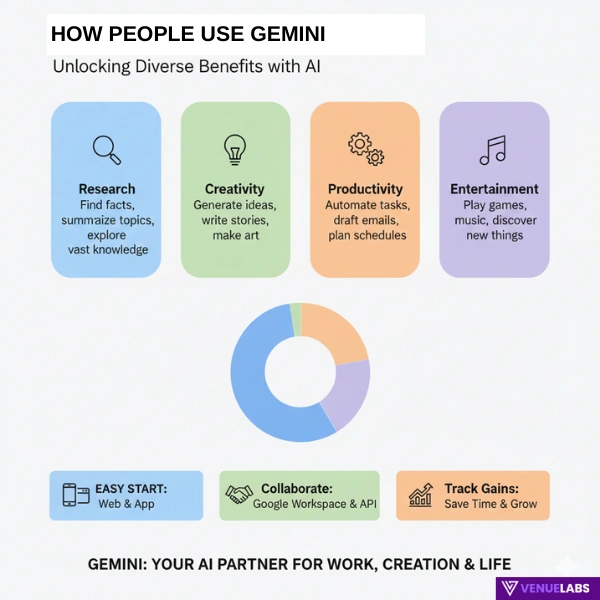
What exactly are these hundreds of millions of people doing on Gemini? The data paints a clear picture: it’s a versatile tool for gaining knowledge, fueling creativity, and boosting productivity.
The primary reasons people turn to Gemini include:
- Researching a Topic of Interest (40%): This is Gemini’s leading use case. Users leverage it as a powerful search companion to delve into new subjects, grasp complex concepts, and explore information more deeply than a traditional search engine allows.
- Creating Content (30%): Here, Gemini’s creative capabilities shine. Users ask it to generate poems, scripts, song lyrics, social media posts, short stories, and even marketing copy.
- Boosting Productivity at Work or School (20%): This category includes tasks such as summarizing lengthy documents, drafting professional emails, assisting with coding, and preparing for presentations.
- Entertainment (10%): A smaller but still significant group enjoys Gemini for leisure, engaging in text-based games, seeking recommendations for music and videos, or simply having a casual conversation.
Gemini Usage Statistics: A Closer Look
| Usage Purpose | Percentage Of The Users | Examples of How Users Benefit |
| Research | 40% | Students ask for explanations of historical events, professionals research market trends, hobbyists explore detailed guides on new interests, and everyday users look up facts quickly. This often involves asking follow-up questions to dig deeper into a subject. |
| Creativity | 30% | Writers generate plot ideas for novels, marketers draft catchy ad slogans, musicians get help with lyrics, artists brainstorm concepts for visual projects, and even casual users write personalized messages or greetings. Gemini helps overcome writer’s block and sparks new ideas. |
| Productivity | 20% | Office workers summarize meeting notes, students outline essays, developers debug code snippets, small business owners draft email campaigns, and anyone can get help organizing thoughts or planning daily tasks. Gemini acts as a virtual assistant to streamline workflows. |
| Entertainment | 10% | Users play interactive text adventures, ask for movie or book recommendations, create personalized quizzes, generate jokes, or simply have engaging conversations for fun. It provides a novel way to interact with AI beyond purely functional tasks, offering a unique form of digital entertainment. |
Where Do Gemini Users Come From? Traffic Channels Explored
The way users access Gemini’s platform provides interesting insights into its prominence and how it integrates into their digital habits.
| Channel Of Traffic | Percentage Of Traffic On Gemini | Implications for User Behavior |
| Direct Traffic | 76.74% | This is the largest segment by far, indicating that Gemini has become a direct destination for users. People are either typing gemini.google.com directly into their browser, using bookmarks, or accessing it via dedicated apps. This shows a high level of familiarity and intent—users know exactly where they want to go for their AI needs. Gemini has transitioned from a discovery tool to a routine part of many users’ digital lives. |
| Organic Search | 16.77% | Users find Gemini through standard search engine queries, likely by searching for terms like “AI chatbot,” “Google AI,” “conversational AI,” or specific AI functionalities. This traffic indicates new users discovering Gemini or existing users looking for specific information about the platform itself. It highlights the ongoing importance of traditional search for initial discovery and re-engagement. |
| Referrals | 2.92% | This traffic comes from links on other websites, blogs, news articles, and online forums. It suggests that external content creators, journalists, and community discussions play a role in directing users to Gemini. This channel is crucial for establishing credibility and expanding reach through third-party endorsements and mentions. |
| Social Media | 1.88% | While a smaller percentage overall, social media platforms are important for viral spread, awareness, and engagement. Users click links shared on platforms like YouTube, Twitter, Facebook, and WhatsApp. It’s a key channel for showcasing Gemini’s capabilities through short-form content, user testimonials, and discussions. |
| Paid Search | 1.50% | This indicates that Google also invests in advertising campaigns to promote Gemini, appearing in sponsored search results. This helps capture users actively looking for AI solutions and ensures Gemini’s visibility in a competitive market. |
| 0.16% | This traffic comes from email newsletters or direct email campaigns, often from Google itself, announcing new features, updates, or tips for using Gemini. It helps keep existing users informed and encourages re-engagement. | |
| Display | 0.02% | This represents traffic from display advertising networks, where Gemini ads appear on various websites and apps. While a small percentage, it contributes to brand awareness and reaches a broad audience that might not be actively searching for AI. |
Social Media’s Role in Driving Gemini Traffic
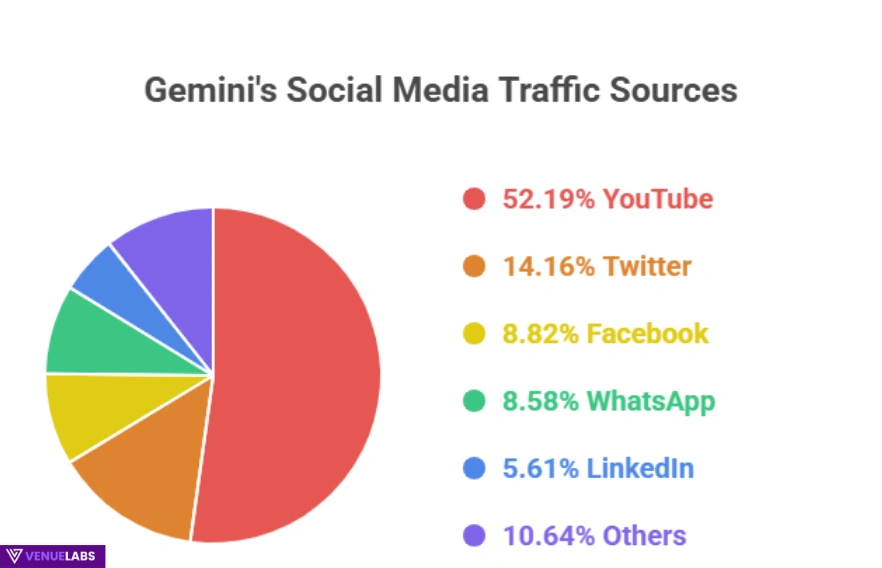
Social media plays a significant role in directing users to Gemini, with YouTube leading the charge.
| Social Media Platform | Percentage Of Traffic Directed On Gemini |
| YouTube | 52.19% |
| 14.16% | |
| 8.82% | |
| 8.58% | |
| 5.61% | |
| Others | 10.64% |
It is not surprising that YouTube is the biggest social media driver of traffic. As a Google-owned platform, it serves as an ideal hub for tutorials, reviews, and guides that seamlessly direct users to Gemini, enhancing discovery and learning.
The Business of AI: Understanding Gemini’s Operational Costs
One of the most intriguing aspects of the AI revolution is its financial implications. Providing millions of intelligent, instantaneous responses daily is anything but cheap; in fact, it is incredibly expensive.
Analysts estimate that the cost for Google to process a single Gemini query ranges between $0.006 and $0.031. While this might seem like a minuscule amount, when scaled up to billions of searches, the cumulative cost becomes astronomical. This significant operational expense is one of the biggest challenges facing Google and other AI providers.
Analysts at Morgan Stanley have calculated the potential annual costs for Google if a certain percentage of its traditional searches were handled by an AI like Gemini. The figures are astounding.
Estimated Annual Cost to Google for AI-Powered Search
| Percentage Of Google Queries Handled By AI | 25 Words Generated Per Query | 50 Words Generated Per Query | 75 Words Generated Per Query | 100 Words Generated Per Query |
| 10% | $0.6 billion | $1.2 billion | $1.8 billion | $2.4 billion |
| 20% | $1.2 billion | $2.4 billion | $3.6 billion | $4.8 billion |
| 30% | $1.8 billion | $3.6 billion | $5.4 billion | $7.2 billion |
| 40% | $2.4 billion | $4.8 billion | $7.2 billion | $9.6 billion |
| 50% | $3 billion | $6 billion | $9 billion | $12 billion |
This table vividly illustrates that if half of all Google searches were to provide a 100-word AI-generated answer, it could add an extra $12 billion per year to the company’s operating expenses. This substantial cost helps explain why Google offers premium tiers, such as Gemini Advanced for $19.99 a month, as a strategy to help offset these massive operational investments.
Gemini’s Rapid Evolution: A Timeline of Growth
Gemini’s journey from a nascent chatbot to a powerful AI platform has been incredibly swift and marked by continuous innovation.
- February 2023: Google first introduced its experimental conversational AI chatbot to the world under the name Bard.
- December 2023: Bard received a significant upgrade and was officially rebranded as Gemini, signaling a new era of enhanced power and capabilities.
- January 2024: Gemini Nano and Pro, smaller and more efficient versions of the AI, were integrated directly into Samsung’s Galaxy S24 smartphones, bringing on-device AI to millions.
- February 2024: Google unified all its AI products under the cohesive Gemini brand. It launched Gemini Advanced, a more powerful, subscription-based version designed for advanced users.
- February 2024: Google also released Gemma, a family of smaller, open-source models based on Gemini technology, allowing developers worldwide to innovate freely.
- November 2024: The Gemini app was released on Apple’s App Store, extending new voice-based features and multimodal capabilities to a much wider audience, including iOS users.
- Early 2025: Gemini 1.5 is widely adopted, offering significantly longer context windows and multimodal reasoning, allowing it to process vast amounts of information simultaneously, including text, images, and video. This iteration excels in handling complex tasks and lengthy documents.
- Mid-2025: Google begins rolling out features powered by Gemini 2.0, focusing on even greater efficiency, nuanced understanding, and real-time data integration, enhancing its ability to provide up-to-the-minute information and personalized responses.
In benchmark tests, the most powerful version, Gemini Ultra, has consistently outperformed top competitors like GPT-4 across a wide range of tasks, proving its leading position at the cutting edge of AI development.
What Users Are Asking on Quora and Reddit: The Latest Insights
Beyond the statistics, what are real users discussing and asking about Gemini on platforms like Quora and Reddit? These conversations reveal practical concerns, emerging use cases, and desires for future features.
- “How can I use Gemini to analyze research papers quickly?”
- Users are increasingly looking for ways to feed Gemini large documents and ask it to summarize, extract key findings, or even identify contradictory information. They want Gemini to be a powerful research assistant that goes beyond simple summarization, helping them understand dense academic or technical texts.
- “Is Gemini better than ChatGPT for coding?”
- Developers are actively comparing Gemini’s coding capabilities, especially its ability to generate, debug, and explain complex code. They are particularly interested in its performance across different programming languages and its integration with development environments. Gemini’s multimodal understanding, which allows it to process images of code or diagrams, is also a hot topic.
- “Can Gemini create images and videos now?”
- With the rise of generative AI, users are eager for Gemini to natively integrate advanced image and video generation features. While it can process images and describe them, direct generation within the core Gemini experience is a highly anticipated feature. This shows a demand for multimodal output, not just text.
- “What are the privacy implications of using Gemini with my personal data?”
- Privacy and data security remain paramount concerns. Users want clear information on how Google handles their conversations and any personal data shared with Gemini, especially when using it for work or sensitive tasks. Transparency around data retention and usage policies is a frequent discussion point.
- “How can Gemini help me personalize my learning experience?”
- Educators and students are exploring Gemini’s potential for personalized learning. They ask about its ability to adapt to individual learning styles, create customized study plans, explain concepts in multiple ways, and generate practice questions tailored to specific needs. This indicates a strong desire for AI to act as a personalized tutor or learning guide.
- “Is Gemini becoming integrated into other Google products besides search?”
- Users are curious about Gemini’s wider integration into the Google ecosystem. Discussions revolve around its role in Google Workspace (Docs, Sheets, Slides), Gmail, and Android, envisioning a seamless AI assistant across all their Google applications. This points to a desire for omnipresent, context-aware AI.
These discussions highlight that users are not just looking for a simple chatbot but a sophisticated, integrated, and privacy-conscious AI assistant that can handle complex, real-world tasks across various modalities.
FAQs About Gemini Statistics
1. How many people currently use Gemini?
As of early to mid-2025, Google Gemini attracts nearly 400 million monthly visits, showing its widespread adoption and consistent engagement from users around the world.
2. What are the main reasons people use Gemini?
People primarily use Gemini for research (40%), to generate creative content like poems and scripts (30%), for productivity tasks at work or school (20%), and for entertainment purposes (10%), demonstrating its versatility as an AI assistant.
3. Which age group uses Gemini the most?
The largest age group using Gemini is millennials, aged 25 to 34 years old, accounting for 31.10% of its visitors, followed closely by Gen Z users aged 18 to 24.
4. How much does it cost Google to run Gemini?
The estimated cost for Google to run a single Gemini query ranges from $0.006 to $0.031, with analysts projecting annual costs potentially reaching $12 billion if 50% of Google searches are handled by AI providing 100-word responses.
5. What new features are users asking for in Gemini?
Users on platforms like Quora and Reddit are actively asking for enhanced capabilities such as advanced research paper analysis, improved coding assistance, native image and video generation, greater transparency on privacy and data handling, and deeper integration across the entire Google ecosystem for a seamless AI experience.
Also Read:
- Artificial Intelligence Statistics
- Metaverse Statistics
- Google Ads Statistics
- Digital PR Statistics
- TikTok Ad Revenue Statistics
Conclusion: Gemini Continues Its Ascent
Gemini has rapidly cemented its position as a major force in the AI chatbot market, showing consistent and significant growth in user engagement since its inception.
With nearly a third of its users aged 25 to 34, millennials form a substantial part of Gemini’s user base, leveraging its capabilities for both productivity and creativity.
The platform currently sees slightly higher usage among males, a trend often observed with new technological adoptions.
As Gemini continues to evolve, integrating cutting-edge features and expanding its global reach, its growing usage and deep engagement suggest it will remain a powerful player in the market.
It is poised to fundamentally change how users interact with AI technology, shaping the future of digital assistance and beyond. We fully expect “How Many People Use Gemini statistics 2025” to show even more impressive numbers.
